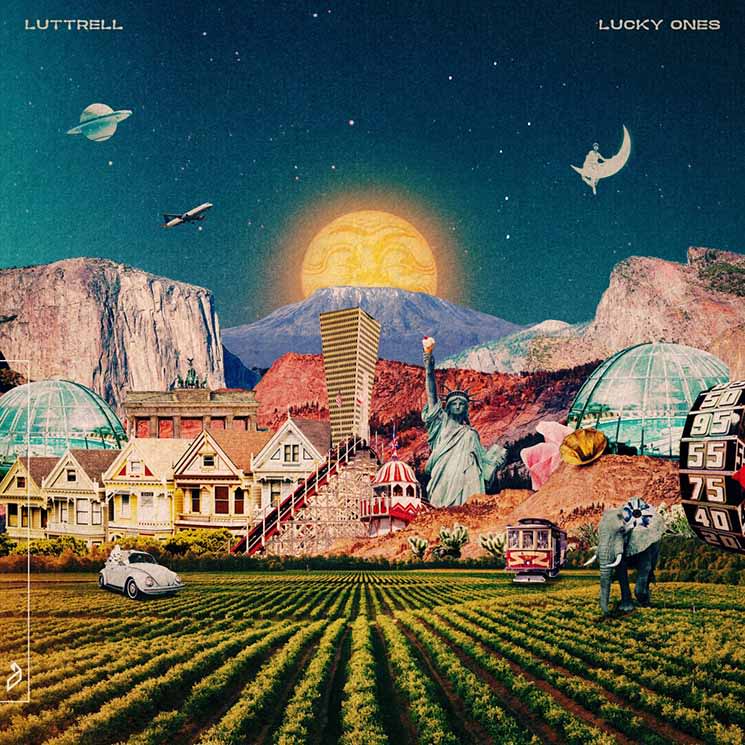Capitalizing on the goodwill that his early 2019 debut garnered from the likes of Tycho and Moby, San Francisco's Eric Luttrell (known professionally by his last name) certainly wasted no time getting his sophomore effort out the door. Lucky Ones arrives barely a year after its predecessor, and unsurprisingly, sounds very similar. Full of the kind of immaculately produced progressive trance that made him such a perfect fit for Anjunadeep in the first place, Luttrell's latest glides by serenely, without a hint of challenge or difficulty.
It's the kind of album that will find mass appeal precisely for its ease and comforting familiarity. Soothing melodies, standard instrumentation, tasteful builds and breakdowns in just the right places, all wrapped up in an inviting production style that is frankly excellent. It really does sound great: piano chords decay off into infinity, bittersweet strings layer on the pathos, and delicate, bell-like synth-tones tinkle prettily throughout. It is by no means unpleasant (even quietly euphoric at times), but too often it sounds like a collection of well-worn and interchangeable parts arranged with meticulous care, but little personality. Obviously fluent in the language of progressive trance, Luttrell unfortunately makes a strong case for it being dead on Lucky Ones.
Hearing the familiar done right can be gratifying, however, and Luttrell certainly front-loads the album with some solid productions. The blissed-out vibes of "What Do You Feel?," "Lucky Ones" and "Universal Theory" are certainly hard to dislike, but they are easy to forget as well. More interesting are the two diverting callback tracks in the album's middle: the aggressive rhythms and percussion of "My Friend the Sun" recalls the clamour of '90s electronica, for instance (the Prodigy are cited as an influence), and followup "Synergy 2000" is a trip back to trance proper, with a massive synth line that Paul Van Dyk would have happily signed off on. Both manage to extract themselves from the hazy sameness of the rest of the album and demonstrate that Luttrell's expert production skills could be put to more interesting ends than warmed over progressive trance ideas.
And really, to call this progressive is a misnomer, it's more like the inoffensive culmination of progressive trance writ large, with all possible points of divergence closed off for safety's sake. Its production, craft and overall slickness will most certainly find it an audience, but those wanting more should look elsewhere.
(Anjunadeep)It's the kind of album that will find mass appeal precisely for its ease and comforting familiarity. Soothing melodies, standard instrumentation, tasteful builds and breakdowns in just the right places, all wrapped up in an inviting production style that is frankly excellent. It really does sound great: piano chords decay off into infinity, bittersweet strings layer on the pathos, and delicate, bell-like synth-tones tinkle prettily throughout. It is by no means unpleasant (even quietly euphoric at times), but too often it sounds like a collection of well-worn and interchangeable parts arranged with meticulous care, but little personality. Obviously fluent in the language of progressive trance, Luttrell unfortunately makes a strong case for it being dead on Lucky Ones.
Hearing the familiar done right can be gratifying, however, and Luttrell certainly front-loads the album with some solid productions. The blissed-out vibes of "What Do You Feel?," "Lucky Ones" and "Universal Theory" are certainly hard to dislike, but they are easy to forget as well. More interesting are the two diverting callback tracks in the album's middle: the aggressive rhythms and percussion of "My Friend the Sun" recalls the clamour of '90s electronica, for instance (the Prodigy are cited as an influence), and followup "Synergy 2000" is a trip back to trance proper, with a massive synth line that Paul Van Dyk would have happily signed off on. Both manage to extract themselves from the hazy sameness of the rest of the album and demonstrate that Luttrell's expert production skills could be put to more interesting ends than warmed over progressive trance ideas.
And really, to call this progressive is a misnomer, it's more like the inoffensive culmination of progressive trance writ large, with all possible points of divergence closed off for safety's sake. Its production, craft and overall slickness will most certainly find it an audience, but those wanting more should look elsewhere.
